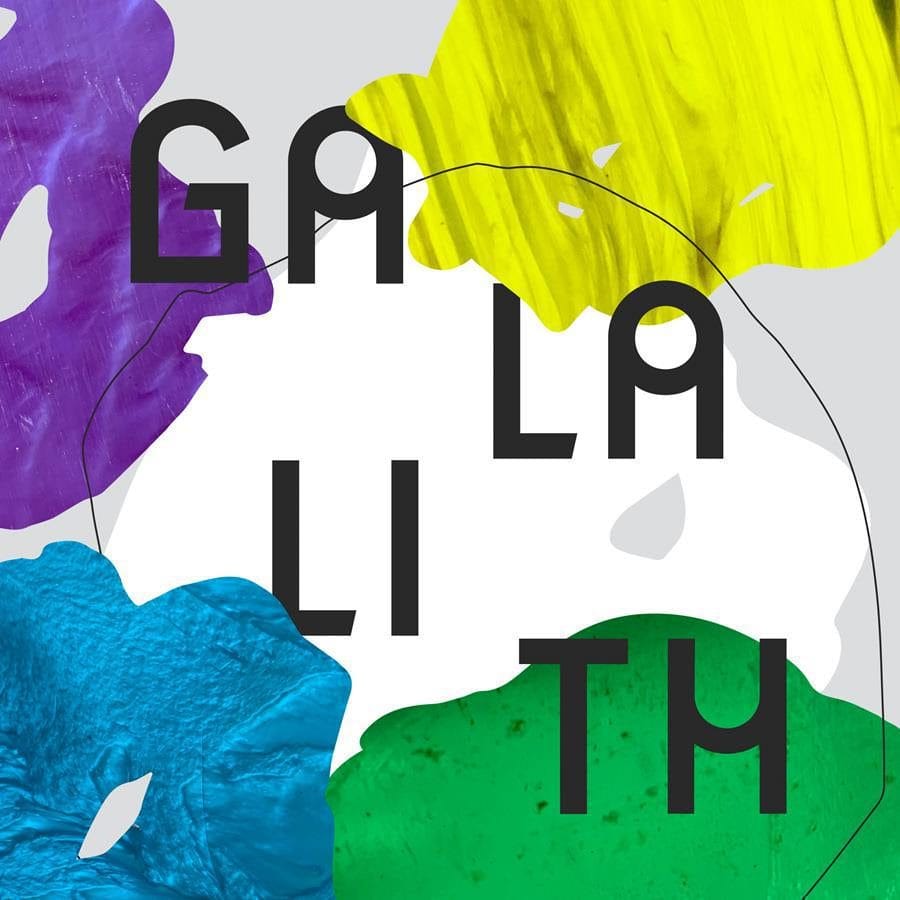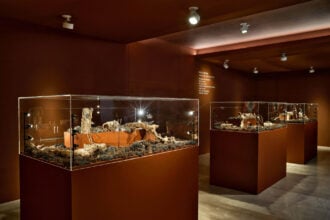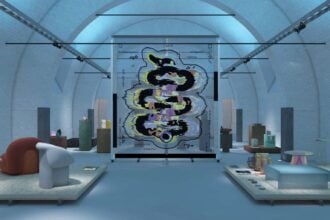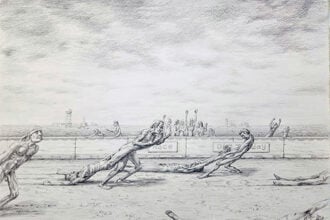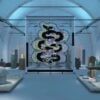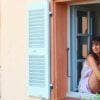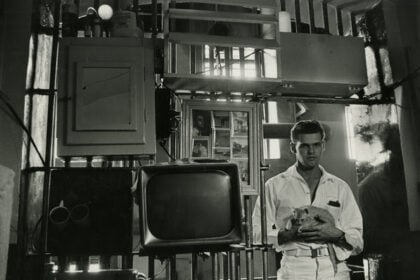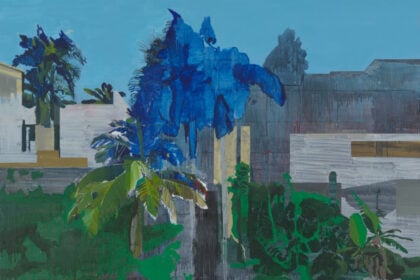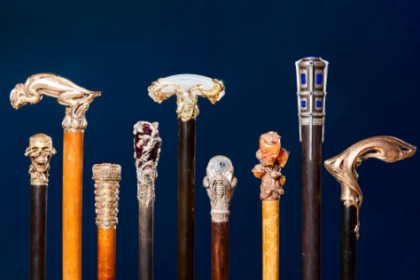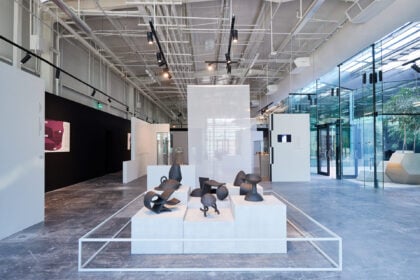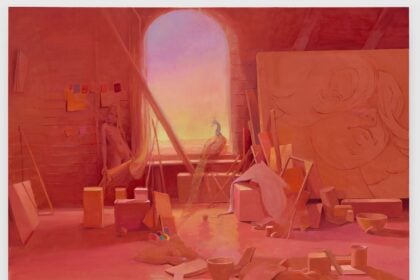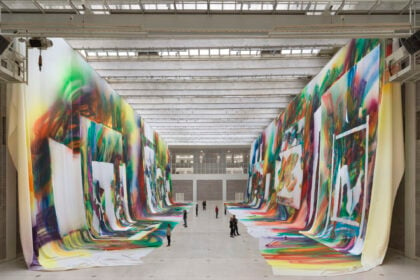Galalith is the first solo exhibition in Ireland by artist Lauren Gault. This exhibition is an expanded staging of her sculptural installations, responding to Temple Bar Gallery + Studios internal gallery space and the building’s external, environmental context. The exhibition incorporates sunlight caught by a street facing solar panel, a threaded assemblage featuring unused galalith(1) stock, recycled rubber safety surfacing, large scale suspended sculpture and a human/non human soundscape (solar controlled). Gault worked with independent feminist curator Katherine Murphy to research and realise this body of work, undertaking a collaborative studio residency at TBG+S.
Collaborations have been central to this exhibition, with Gault and Murphy working with the National Museum of Ireland to access bog butter(2) samples and a Viking ‘toggle’ artefact. This toggle example, found in nearby Fishamble Street, depicts the mythical wolf ‘Fenrir’ devouring the sun at the end of the world. Initially read as a ‘canine with ball’, the symbolism and mythology within this piece denotes both a benign act of domesticated play, and fraught environmental and non-human tensions. This artefact was researched along with contemporary ‘monster wolves’ – solar powered, robotic scarecrows which act as wildlife deterrents through the production of sound and a ‘wolfish’ appearance.(3)
Ireland has a rich lupine history – garnering the nickname ‘Wolf Land’ in the early 17th century, as well as its iconic wolf-hound breed and prospective re-wilding policies of today. These histories continue to circularly evolve, with our increase in demand for domestic canine pets, set against rising livestock and sheep worrying – a complex oscillation between domestication and wildness, of the controlled and unboundaried.
Drawing from and combining these reference points, a specifically designed solar panel was developed with the Solar Energy Applications Group at Trinity College. This panel and its attached technology acts as a controller for the internal sound work, volumetrically shifting with the levels of solar energy present across each day. Rather than acting as a deterrent, these sounds are invitational – featuring calls produced by ‘speaking’ and barking ravens, howling wolf-dogs, sounds from the sun, and frequencies only detectable by the non-human.
There is a distinct presence of dual working contexts in the exhibition, with ephemera collected from city and active rural environments, expanding Gault’s ongoing research which engages with agri-relations and agroecology, matter interconnectivity, and agency within unstable micro and macro environmental systems.
Gault’s material treatments and museological analysis techniques within Galalith, such as ‘micro-fading’ and solar-faded objects, give a tangible visualisation of a material’s future state. Through these works, the natural flow of time is interrupted, indicating the possibility of alternative or suspected futures, whilst raising questions around agency, conservation and loss.
Footnotes: (1) galalith ???? (gala, “milk”) and ?????? (lithos, “stone”) is a synthetic plastic material manufactured from the interaction of the protein ‘casein’ in milk and formaldehyde. Galalith was predominantly used in the production of objects which involved close human touch and bodily proximity, for example within jewellery and button production, pens, piano keys, combs, tokens, and plectrums. It is biodegradable, non-allergenic and virtually non-flammable. The galalith within this exhibition was sourced as unused stock from circa 1940-50 (sun damaged, un-worked rods and blanks); as well as some newly manufactured stock – currently used as an alternative to contemporary, oil based plastics.
(2) bog butter – a fatty substance, usually dairy in origin, which has been buried and preserved, then found and resurfaced, in peat bogs in Ireland and Scotland. This practice dates back 3,500 years, with samples in Ireland dating from the first century CE. Often accidentally unearthed by farmers and turf cutters, this substance can appear uncannily fresh, emerging preserved from the peat bogs’ stable micro climate and into a new, current time. The bog butter form reproduced in this exhibition is from the townland Corlea in Co.Monaghan, accessed from the NMI stores, scanned and 3D printed into stone-like solidity.
(3) Kuebiko is the Shinto deity of knowledge and agriculture. Often represented as a scarecrow which cannot move yet has a comprehensive awareness of the world, Kuebiko is a Japanese word which refers to fatigue generated by senseless violence. A spectral figure in the exhibition, Kuebiko is used to open up dialogue around environmental agency, shared feelings of potential loss/grief and the complexities of our evolving agri-relationships.
Biographies
Lauren Gault is a Magheramourne and Glasgow based artist, born in Belfast. She graduated from Duncan of Jordanstone College of Art and Design in Dundee in 2008. Her recent solo exhibitions include: Cithra, The Tetley, Leeds (2021), C I T H R A, Gasworks, London (2020); forgets in knots, Kantine, Brussels (2019), drye eyes, Grand Union, Birmingham, (England 2019), O-n, The Workbench, Milan (2019), present cOmpany, CCA Derry~Londonderry, Northern Ireland (2018)
Katherine Murphy is a Scottish independent curator and producer. For the past decade she’s worked with not-for-profit organisations, prominent artists, art institutions, museums, and international art festivals. With a background in contemporary philosophy and a passion for developing expanded forms of feminist practices through a process of unfolding. Her Unfolding project (2021) works closely with artists to manifest and realise feminist, independent projects, sustainable working practices. Galalith is the first collaborative Unfolding project with support from TBG+S and Creative Scotland.
Lauren Gault and Katherine Murphy have undertaken a collaborative residency at TBG+S in the lead up to the exhibition and will stay until the end of May 2022. After the exhibition at TBG+S, the project and specific artworks will be re-imagined and relocated to an outdoor, rural location in Scotland. Murphy was awarded the opportunity to curate this exhibition through an Open Call held by TBG+S in 2021.
Galalith is funded by Temple Bar Gallery+Studios and Creative Scotland and supported by Gremolith Italia and Solar Energy, Applications Group @TCD Solar, Dept of Civil, Structural and Environmental Engineering, Trinity College Dublin.
Temple Bar Gallery + Studios
5 – 9 Temple Bar, Dublin 2,
D02 AC84, Ireland
